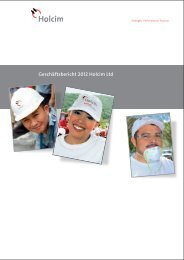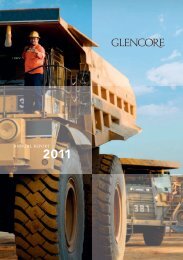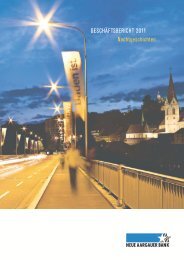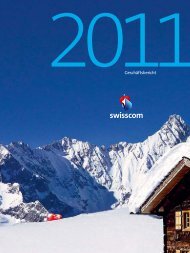Transocean Proxy Statement and 2010 Annual Report
Transocean Proxy Statement and 2010 Annual Report
Transocean Proxy Statement and 2010 Annual Report
Create successful ePaper yourself
Turn your PDF publications into a flip-book with our unique Google optimized e-Paper software.
See “Part I., Item 3. Legal Proceedings—Macondo well incident.”<br />
Insurance coverage—We expect certain costs resulting from the Macondo well incident to be recoverable under insurance<br />
policies as described below.<br />
Hull <strong>and</strong> machinery coverage—Deepwater Horizon had an insured value of $560 million, <strong>and</strong> there was no deductible for the<br />
total loss of the unit. During the year ended December 31, <strong>2010</strong>, we received $560 million of cash proceeds from insurance recoveries for<br />
the loss of the drilling unit. During the year ended December 31, <strong>2010</strong>, we recognized a gain on the disposal of the rig in the amount of<br />
$267 million. We also have coverage for costs incurred in our attempt to mitigate or minimize damage to Deepwater Horizon up to an<br />
amount equal to 25 percent of the rig’s insured value, or $140 million. We also have coverage for wreck removal, which includes coverage<br />
for removal of diesel, for up to 25 percent of Deepwater Horizon’s insured value, or $140 million, with any excess wreck removal liability<br />
generally covered to the extent of our excess liability coverage described below, in the event wreck removal is required. As<br />
Deepwater Horizon was a total loss, there was no deductible for any applicable costs incurred to mitigate damages or for wreck removal,<br />
provided the costs are within the limits mentioned above.<br />
Excess liability coverage—We carry $950 million of commercial market excess liability coverage, exclusive of deductibles <strong>and</strong><br />
self-insured retention, noted below, which generally covers offshore risks such as personal injury, third-party property claims <strong>and</strong><br />
third-party non-crew claims, including wreck removal <strong>and</strong> pollution. This $950 million excess liability limit is an annual aggregate limit<br />
covering the entire <strong>Transocean</strong> worldwide fleet, including Deepwater Horizon. Prior to the April 20, <strong>2010</strong> Macondo well incident, there<br />
were no known incidents or occurrences that would have eroded the $950 million aggregate excess liability limit. We generally retain the<br />
risk for any liability losses with respect to the Macondo well incident <strong>and</strong> any other incidents or occurrences in excess of $1.0 billion. In the<br />
case of the Macondo well incident, we have paid $65 million in deductible costs prior to any insurance reimbursements from the excess<br />
liability insurance. We expect liability costs from the Macondo well incident in excess of the $65 million deductible costs to be covered up<br />
to the $950 million excess liability limit.<br />
In May <strong>2010</strong>, we received notice from the operator under the drilling contract for Deepwater Horizon maintaining that it believes<br />
that it is entitled to additional insured status as provided for under the drilling contract. In response, many of our insurers filed declaratory<br />
judgment actions in the Houston Division of the U.S. District Court for the Southern District of Texas in May <strong>2010</strong>, seeking a judgment<br />
declaring that they have limited additional-insured obligation to the operator. These actions have been transferred to the MDL for<br />
discovery purposes in the U.S. District Court, Eastern District of Louisiana. In the actions, our insurers maintain that, although the drilling<br />
contract requires additional insured protection for certain entities related to the operator, the protection is limited to the liabilities assumed<br />
by us under the terms of the drilling contract, which includes above l<strong>and</strong> or water surface pollution emanating from substances in our<br />
possession, such as fuels, lubricants, motor oils, <strong>and</strong> bilge. Our insurers maintain that, under the drilling contract, the operator accepted<br />
full responsibility <strong>and</strong> indemnified us for any pollution not assumed by us. Further, our insurers contend that the liabilities the operator<br />
currently faces arise from pollution originating from the operator’s well, below the surface <strong>and</strong> not within the scope of the additional insured<br />
protection.<br />
Specifically, our insurers seek declarations that: (1) the operator assumed full responsibility in the drilling contract for any <strong>and</strong> all<br />
liabilities arising out of or in any way related to the release of oil originating from its well; (2) the additional insured status in the drilling<br />
contract therefore does not extend to the pollution liabilities the operator has incurred <strong>and</strong> will incur with respect to oil originating from its<br />
well; (3) our insurers have no additional obligation to the operator under any of the policies for the pollution liabilities it has incurred <strong>and</strong> will<br />
incur with respect to the oil originating from its well; <strong>and</strong> (4) the operator is not entitled to coverage under any of the policies for pollution<br />
liabilities it has incurred <strong>and</strong> will incur with respect to the oil originating from its well. The operator has filed a cross-claim, seeking contrary<br />
declarations.<br />
On October 28, <strong>2010</strong>, our insurer notified us that they have received letters from representatives of Anadarko <strong>and</strong> MOEX, each<br />
advising of its intent to preserve any rights to our insurance policies that it may have as an additional insured under the drilling contract.<br />
Any such claim, if paid to the operators, could limit the amount of coverage otherwise available to us. We can provide no assurances as to<br />
the estimated costs, insurance recoveries, or other actions that will result from this incident. See “Part I., Item 1A. Risk Factors.”<br />
Other insurance—We also carry $100 million of additional insurance that generally covers expenses that would otherwise be<br />
assumed by the well owner, such as costs to control the well, redrill expenses <strong>and</strong> pollution from the well. This additional insurance<br />
provides coverage for such expenses in circumstances in which we have legal or contractual liability arising from our gross negligence or<br />
willful misconduct.<br />
Limitation of liability action—At the instruction of our insurers <strong>and</strong> to preserve our insurance coverage, pursuant to the federal<br />
Limitation of a Shipowner’s Liability Act (the “Limitation Act”), we filed a complaint in the Houston Division of the Southern District of Texas<br />
on May 13, <strong>2010</strong> regarding the casualty of the Deepwater Horizon rig. The action has been transferred to the U.S. District Court, Eastern<br />
District of Louisiana for further proceedings. Under the Limitation Act, a vessel owner is generally liable only for the post-accident value of<br />
the vessel <strong>and</strong> cargo as long as the vessel owner can show that it had no knowledge of or privity of knowledge with entities that were<br />
negligent. Claims limited under the Limitation Act include personal injury, wrongful death, <strong>and</strong> damage to property contained on the rig.<br />
Statutory claims that may be asserted by the U.S. government or individuals under OPA, the Parks Systems Resource Protection Act, the<br />
National Marine Sanctuaries Act (the “NMSA”), the Rivers <strong>and</strong> Harbors Act or CERCLA <strong>and</strong> claims by the U.S. government for fines <strong>and</strong><br />
penalties under the Clean Water Act, the NMSA, the Marine Mammal Protection Act, the Endangered Species Act, the Shipping Act, the<br />
AR-58

















